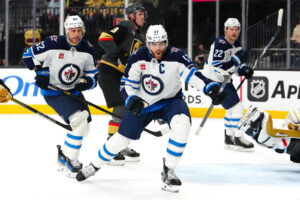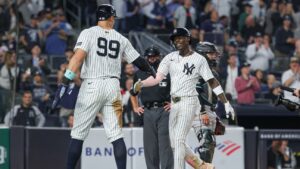NASCAR Commissioner Steve Phelps joined the “Hauler Talk” podcast to discuss the origins of his newly-created position, his vision for the future and several other hot-button issues.
During a wide-ranging hourlong interview, Phelps said the creation of the first official commissioner role was driven partly by the optics of virtually every other professional sport having that role.
“How we are governed is different from stick-and-ball sports,” Phelps said. “[NFL Commissioner] Roger Goodell has 32 owners that essentially are his owners and entrust him to run the sport. It‘s a closed system. Ours is different. There are lots of stakeholders that are part of it.”
Phelps said his role would be two-pronged in overseeing the governance of NASCAR, but more broadly to ensure that the drivers, teams, manufacturers and fans also understand and can participate in the direction of the sanctioning body.
Phelps said creating a commissioner position first was suggested by Steve O‘Donnell, who has taken over Phelps‘ previous role as NASCAR president. Phelps then brought the idea to NASCAR CEO Jim France and executive vice chair Lesa France Kennedy for their approval.
“When you have 77 years of history and you don‘t have a commissioner, I appreciate them understanding the change,” said Phelps, who plans to distance himself from the officiating side of NASCAR (though he will continue to attend most Cup Series races — either Phelps or O‘Donnell and often both will be at every race).
Why does NASCAR need a commissioner now?
“It‘s a time that our sport has experienced growth,” Phelps said. “There was a time when we had some significant declines. But it‘s a time since 2019 that looks different and feels different, and if you‘re in this sport, it feels good right now. The competition is amazing. The ratings are strong. We‘ve got new media partners. Charter values are soaring. We‘ve got wind at our back. OK, now what? That‘s really what it was. Whether it‘s international growth or just the opportunities afforded to us with my elevation.”
Since the Monday announcement of his promotion, Phelps said he already had witnessed new opportunities that resulted from naming a commissioner.
“Those types of things help put us shoulder to shoulder with every other major sport, which I believe we are,” Phelps said. “But within the media and sports arena, we‘re looked at that way of shoulder to shoulder with Major League Baseball, the NHL, Major League Soccer and the PGA Tour.”
Serving as president of NASCAR since 2018, one of Phelps‘ signature moments was spearheading NASCAR becoming the first major-league sport to return to action during the pandemic. He heard from a handful of other pro sports commissioners before NASCAR‘s return at Darlington Raceway in May 2020.
RELATED: Darlington weekend schedule
“I had four to five texts from commissioners from other sports that said, ‘We‘re rooting for you,‘ “ Phelps said and then joked, “And for the first time, I actually believed them.”
Phelps said NASCAR‘s response to the pandemic reinforced why he believes collaboration is the key to success.
“Our sport, when things are really hard, we do things really well,” he said. “The sport is at its best when it comes together. That‘s why I push for collaboration every single chance I get. Because we‘re just better together than we are apart.”
After overseeing a new media rights deal, the rollout of the Next Gen car and a revamp of the schedule in the past five years, Phelps said global growth would be a heavy focus to maintain the momentum as commissioner.
“International expansion is fertile ground for us,” he said. “What that looks like, we‘re studying now. We have series in Brazil, Mexico, Canada and Europe. Is that the right model to continue expansion that way, or should we think more broadly of what it‘s going to look like that looks different than that? We‘re exploring all of those things.
“The opportunity to partner with stakeholder groups is a real opportunity as well, including race teams. There‘s been discussion about, is there private capital that could help us internationally? Maybe. Could I see a scenario of racing in Mexico City and somewhere else south or north of the border? Maybe. There‘s lot to think about what that‘s going to look like.
“It‘s going to require us to be very thoughtful about what those opportunities are and making sure we communicate that appropriately at the right time. One of the things we put in place in the charter agreements, the race team wants to have a seat at table. We created an owner advisory council with Justin Marks, Heather Gibbs and Brad Keselowski. We want to make sure they are sitting in the three- to five-year planning meetings now of what the sport looks like in the future. Not next year but in 2030. Our ownership thought it was important to create this. It‘s not a voting board, but it‘s an important group.”
Other topics covered during Phelps‘ interview on “Hauler Talk”:
— The integration of the Next Gen car and maintaining and building new relationships with NASCAR drivers
— An important lunch that he had with Kevin Harvick about NASCAR‘s commitment to safety
— A phone call from Joey Logano after an airborne crash at Talladega Superspeedway
— Giving NASCAR fans a seat at the table
— The future of the track in Fontana, California
— How tariffs could impact the cost of the Next Gen car and NASCAR‘s manufacturers
Click on the embed above to listen or search for “Hauler Talk” wherever you download podcasts to hear it on your phone, tablet or mobile device.
Nate Ryan has written about NASCAR since 1996 while working at the San Bernardino Sun, Richmond Times-Dispatch, USA TODAY and for the past 10 years at NBC Sports Digital. He is a contributor to the new “Hauler Talk” show on the NASCAR Podcast Network. He also has covered various other motorsports, including the IndyCar and IMSA series.
Read the full article here





